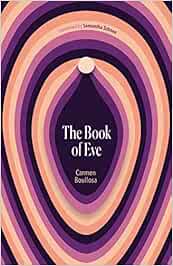3.5 Stars
This is a feminist re-telling of the Book of Genesis. Told from Eve’s perspective, it challenges the Biblical patriarchal narrative.
According to Eve, she, not Adam, is the first human; Eden is not a paradise; the knowledge gained by her eating a fruit is essential, not damning; Abel, not Cain, is the villain; Noah never builds an ark; and the Tower of Babel is destroyed by an angry Earth. Eve’s story, however, is subverted by Adam. Jealous of Eve, he distorts the truth of creation and places himself at the centre and establishes a religion which sidelines Eve and all women.
Eve’s depiction of Eden is interesting. She describes it as bland and “a tepid emptiness, a void.” It is a place with “nothing good, nothing bad, no clothes, no scent, no taste, no words.” Leaving Eden allows her to realize the beauty of the world and to discover fire, gastronomy, pleasure, and words. Eve claims that “The apple was the key that set us free. It made us understand ourselves, making us who we were.” She states, “the unbitten apple that hung from the branch of the fruit tree would otherwise have rotted. I gave it meaning because I enjoyed it, and I gave us meaning, too: feelings, intuition, action, desire, pleasure.” Cain argues with his father that “’knowledge is a good thing, life is good, how can you say that what Eve has given us is bad?’”
Eve is a fully-developed character, though at times she seems almost saintly. She is the narrator so of course her flaws are not highlighted, though she does castigate herself for remaining silent: “I never should have held my tongue when I had things to say. Never.” It is reasonable to question how reliable a narrator she is: certainly there is a lack of nuance in the depiction of Adam. Because she experiences pleasure “so effortlessly and simply,” she believes Adam suffers from “clitoris envy. Males always have it, that unspoken, unexpressed envy of the clitoris.” In addition, “His belly always lacked what he needed to be able to give birth.” This jealousy, she asserts, is the foundation of his religiosity and his spiteful concocting of tales in which Eve is “’just the offshoot of a piece of [man], an afterthought, worthless.’” Since we are not privy to his thoughts and feelings, as we are to Eve’s, Adam’s violence and bizarre behaviour sometimes seem to come out of nowhere.
Just as Eve emphasizes that she is the mother of all, she suggests that Adam is responsible for all the mistreatment of women: “with his absurd stories Adam planted the seed, ignited the flame that made raping women a right, a necessity, a pleasure, and even a joy, and justified the murder of more than one – beautiful but nameless – only on account of their gender.” In the end, she states that “being male became equated with causing pain,” all because “They feared us because we could give life . . . they feared our red lips and our beauty, they feared their attraction to us and the boundless pleasure we experienced.” A litany of rules which women have to follow is presented: “We lost half of our names. We had no right to own property. Children were named after their fathers even though [women] were still responsible for looking after them. They used sharp stones to excise the clitoris . . . They made up all sorts of rules about good manners and bad manners. They imposed them on all our households. . . . girls –with or without clitorises – weren’t allowed to attend school. . . . And if they went out in the streets, it was never without a chaperone, and the girls and their mothers had to veil their bodies and faces.”
Besides being critical of men who place themselves above women, the book criticizes humans’ treatment of the planet. Earth is angry at the arrival of humans: “’What am I going to do with so many people living off of me!’” Earth and He (God?) arrive at an agreement so He would help Earth to produce enough. The agreement also defines “the unforgiveable exceptions to the natural order of things . . . any group that cursed, slandered, or plundered the Earth senselessly would be subjected to lethal heatwaves and freezes.” As the world becomes more populated, “Earth was even angrier. What she had known from the beginning was proving true: the hordes of humanity would strip her bare. Arrogant, they continued to build upon her surface, ignoring her.”
Despite its serious themes, there are some humourous touches. Who cannot smile at Eve’s comment that “Adam, who was aware of our nakedness, hid among some plants with very small leaves” or Adam and Eve’s attempts to procreate?
Some readers will find this an uncomfortable read. It questions the existence of God. Eve describes only an abstract Thunder who “expressed itself like falling rock, without words, without verbs, without adjectives; like long oooohs and aaaahs emanating from a fearsome throat, like the blows of an axe or shovel or hammer; but not guttural like the sounds a mouth makes; more like a weapon, or gunpowder.”
Though sometimes heavy-handed in its approach, the book does emphasize the power of words and stories: “The stories Adam invented had triumphed. And therein lies the power of the word: it shapes mankind, their customs, their communities. Words don’t just say things, they do things.” Certainly the novel should leave readers thinking about how the story in the Book of Genesis, definitely not written by women, has shaped the lives of women.

No comments:
Post a Comment